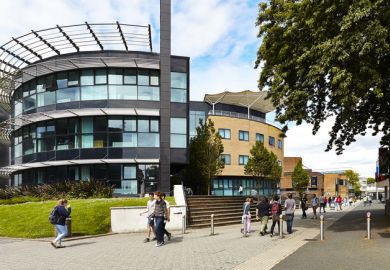From the beginning of his tenure in 2022, England’s latest director for fair access and participation, John Blake, has spoken about widening access and participation (WAP) as a moral duty for universities. And he is right to do so.
To fulfil that duty, Blake suggests that the Office for Students (OfS) – where his role now sits – will have to pay attention to “evaluation, evaluation, evaluation” of current practice. But I think we already know that the huge industry which has grown up around WAP since significant expenditure on it was compelled as part of the reforms that tripled English tuition fees in 2012 is not working anywhere near as well as we need it to. This is, in part, because universities compete to meet their own targets rather than collaborate on meeting national ones.
To better fulfil our moral duty, I suggest that we take a fresh look at WAP and consider whether its focus on outreach should be swapped for a focus on in-reach, within university communities.
Let me explain. Who has the greatest influence on decisions that school pupils make in relation to study at school and university? The answer is well understood: family, friends and teachers. So, if WAP outreach activity is to have impact, it must involve these influencers. I know from my home institution that colleagues working in WAP are very aware of this and include forums and CPD for teachers in the “access and participation plans” (APPs) that they have to agree with the OfS. I expect that there are also APPs that include working with and supporting parents.
Of course, external events and activities can and do make a difference – but they won’t bring about the step change in our collective ability to ensure that all those who would benefit from university are able to enrol. Apart from anything else, schoolteachers are under enormous pressure already – due, in part, to compensating for the thousands of vacant teaching posts at schools up and down the country.
But here is where there could be a win-win. If universities could increase the number of their graduates who go into schoolteaching, that would both address the teacher crisis (especially in STEM subjects) and bring a ready-made army of advocates for university study into daily contact with school pupils.
University graduates already constitute the single largest pool of new recruits into the schoolteaching profession, but it is clear that this pool needs to be widened and deepened. Since university staff are the professional influencers of our students, perhaps the best way for us to exercise our moral duties around WAP is to use that influence to encourage them to go into teaching and, in turn, encourage their own pupils to apply to university.
A proof of concept study concerning this idea is already under way. Teaching Mathematics as a Career (TeMaC), established by the London Mathematical Society and supported by other professional bodies, sees UK university mathematics departments (currently about half of them) pledge to advertise or deliver activities that encourage their students to consider teaching mathematics as a career. It is a collaborative venture, building a community of practitioners to support a collective goal. And at least while insufficient numbers of graduates continue to enrol on teacher-training programmes, the problem of competition among universities seen in other WAP activity is nowhere to be seen.
But let’s not leave it to mathematics departments alone. All departments and institutions should consider ways in which they can encourage their student communities to consider schoolteaching as a career. One of the reasons that teaching is not popular is that it seems to lack the prestige of other graduate routes. If we as the higher education community came together to change that, highlighting the essential role that teachers play, that would be a real achievement – and not merely for WAP.
Does the OfS have a role to play in pushing universities in this direction? Perhaps. Depending on how Blake’s evaluation plays out over the coming years, it may well be that recruiting for the schoolteaching profession become a required standard in universities’ APPs.
After all, if WAP is a moral duty and an internal-facing approach is the most effective way of fulfilling that duty, it follows that it would be immoral to neglect it.
Jane White is professor of mathematics at the University of Bath and chair of Teaching Mathematics as a Career at the London Mathematical Society.
Register to continue
Why register?
- Registration is free and only takes a moment
- Once registered, you can read 3 articles a month
- Sign up for our newsletter
Subscribe
Or subscribe for unlimited access to:
- Unlimited access to news, views, insights & reviews
- Digital editions
- Digital access to THE’s university and college rankings analysis
Already registered or a current subscriber?








